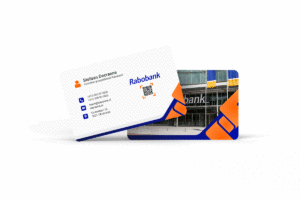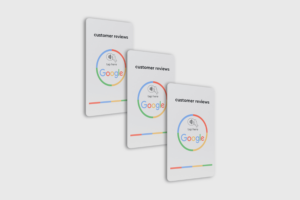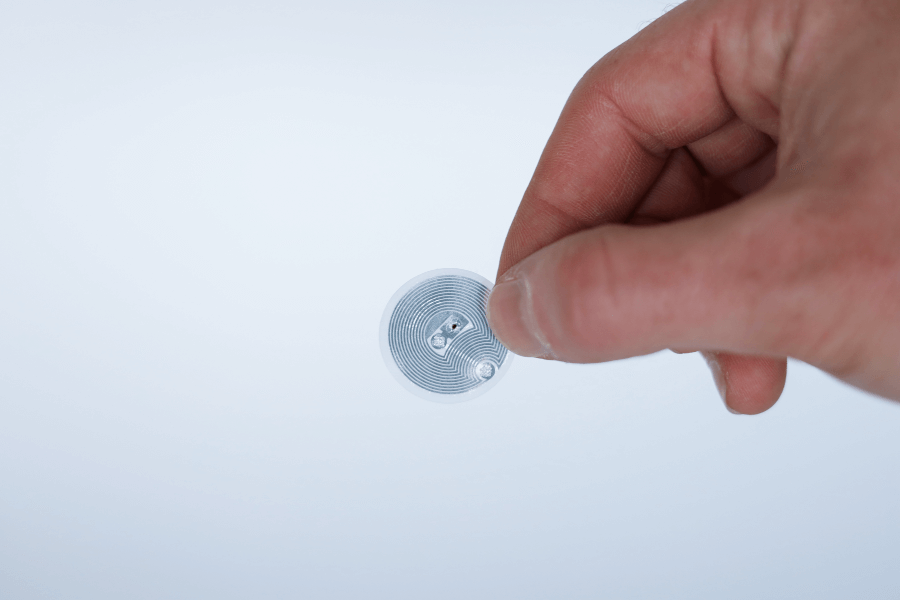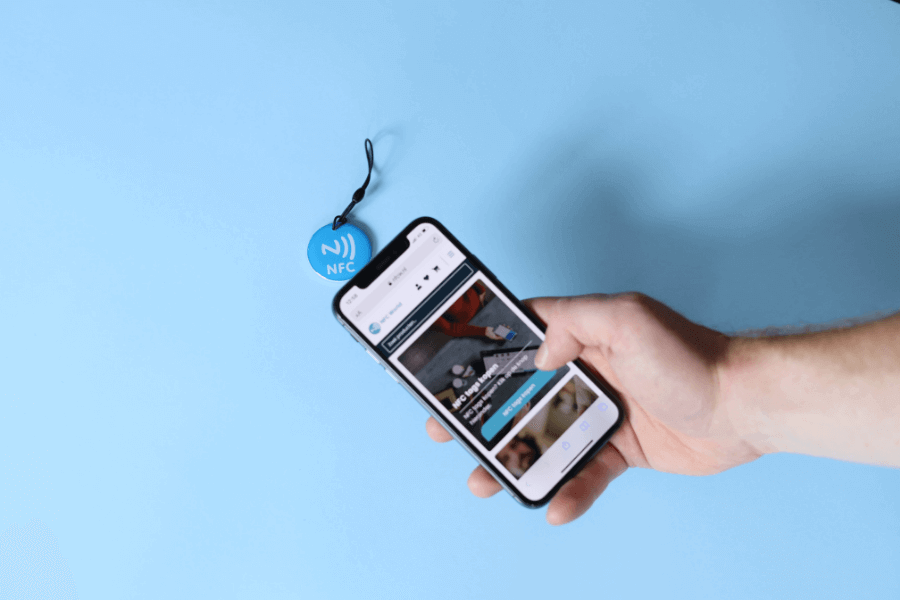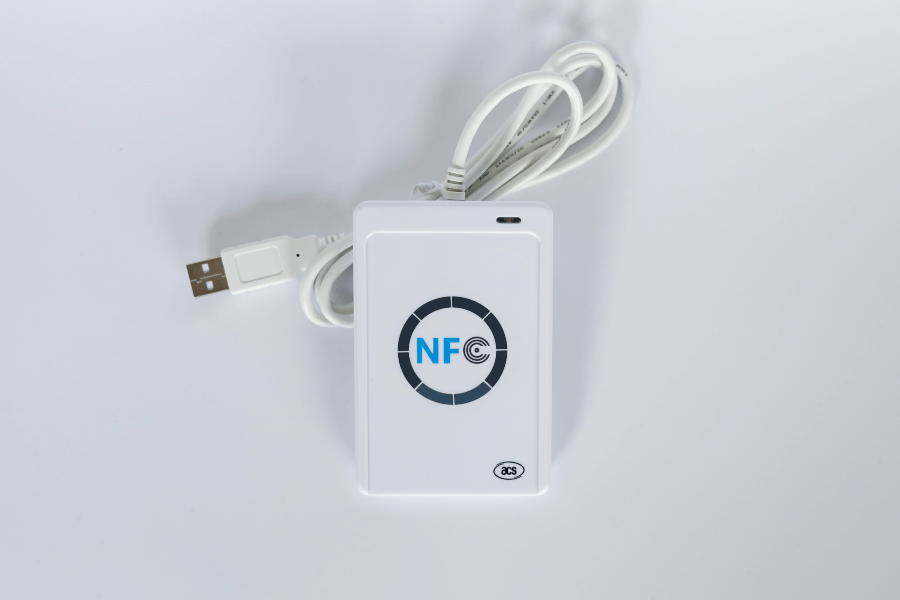No products in the cart.
NFC Products
Review products
Shopping Cart
Everything you need to know about Near Field Communication (NFC)

Near Field Communication(NFC) is a technology that allows the wireless exchange of information between devices at very short distances. This technology is increasingly being used in various industries, including marketing, payments and security. In this blog, we will take a closer look at what Near Field Communication is and how it can be applied to improve businesses' online visibility and conversion rates.
Table of contents
Definition of NearField Communication
NFC stands for Near Field Communication, a wireless communication technology that lets devices communicate with each other over short distances. NFC uses radio waves to exchange information between two NFC-compatible devices located within a few centimeters of each other.
Importance of NFC in smartphones
The importance of Near Field Communication in smartphones is great because it allows users to quickly and easily exchange data and make payments. NFC also enables smartphones to communicate with other devices, such as smartwatches, fitness trackers and smart home devices. This opens the door to new applications and opportunities for users. Moreover, NFC technology is more secure than traditional communication technologies such as Bluetooth and Wi-Fi because the distance between the devices is very short, making it more difficult for third parties to intercept communications.
The benefits of Near Field Communication
- Fast and easy communication between devices
NFC makes it possible to quickly and easily exchange data between devices a short distance apart, such as between two smartphones. This makes it possible to share information without the need for cables or other connections.
- Contactless payments
NFC enables smartphones to be used as digital wallets for contactless payments. By holding the smartphone against an NFC-compatible payment terminal, the user can easily pay without the need for cash or a debit card.
- Identification and authentication
NFC can also be used for identification and authentication purposes, such as logging into a secure network or accessing secure buildings or locations. Using an NFC-compatible card or smartphone for identification makes the process more secure and convenient.
- Simple file exchange
NFC makes it easy to exchange files between devices, such as between smartphones or between a smartphone and a computer. By simply holding the devices against each other, files can be transferred without the need for a cable or another device. This can be useful for sharing photos, videos or other files.
Security and privacy considerations in NFC use
Security protocols and security measures
In addition to its benefits, NFC technology also carries some security risks. To minimize these risks, several security protocols and security measures have been developed.
Security protocols include, for example, encrypting data exchanged via Near Field Communication so that it cannot be intercepted by third parties. Another protocol is verifying the identity of the device being communicated with to ensure that only authorized devices can access certain information.
In addition to these protocols, there are several security measures that can be taken to improve the security of NFC technology. For example, disabling NFC when it is not needed, installing software updates and avoiding the use of public NFC readers.
Privacy risks and how to minimize them
In addition to security risks, there are also privacy risks associated with NFC technology. For example, an unauthorized party may gain access to personal information, such as banking information, if the NFC connection is not properly secured. To minimize these risks, it is important to use only NFC applications from trusted sources and to always properly secure the NFC connection with a password or other authentication methods.
Near Field Communication in the future
New applications and developments
NFC technology already has many different applications, but there are still new developments and opportunities that can be explored in the future. Some promising new applications include the use of Near Field Communication in smart cities and healthcare, for example for managing patient data and drug tracking.
Predictions about the future of NFC in smartphones
There are also predictions about the future of Near Field Communication in smartphones. One expectation is that NFC will become even more integrated into mobile devices, making it even easier to use NFC applications. It is also expected that NFC will play an important role in the further development of the Internet of Things (IoT), in which devices communicate with each other over the Internet.
Another interesting development is the emergence of Wearable Technology, where NFC chips are being integrated into clothing and accessories. This would make it possible to easily and quickly exchange information between different devices, such as smartphones, smartwatches and smart glasses.
All in all, then, there are still many possibilities for the future of NFC technology and it will be interesting to see how it will continue to develop and in what new applications it will be used.
Conclusion
In a nutshell, NFC technology offers several benefits and applications, including fast communication, contactless payments, identification and authentication, and easy file sharing. To use NFC securely and efficiently on your smartphone, it is important to follow security protocols and security measures, and minimize privacy risks. By taking these measures, you can confidently enjoy the benefits of Near Field Communication on your device.
Check out our NFC tagsHow does NFC work?
NFC works through electromagnetic fields. When two NFC devices are brought close together, they create an electromagnetic field that transfers information between them.
What are the benefits of NFC?
NFC makes it possible to quickly and easily exchange data between devices, make contactless payments, use identification and authentication, and exchange files between devices without the need for cables or other connections.
What are examples of NFC applications?
Some applications of NFC include:
- Cell phone payments (for example, Apple Pay or Google Wallet)
- Access control (for example, access passes for events or commercial buildings)
- Identification (for example, identity cards or medical records)
- File sharing between mobile devices (e.g., photo or music sharing)
Don't miss anything and read all about NFC
Our most popular products
Reviews
★★★★★
Very satisfied with the serviceThe NFCW passes are a great example of how to use Sustainable Technology and still make an impact. We are very pleased with the service and quick response times.
Vera Timmermans - Evoke Staffing★★★★★
Quick response to inquiriesQuick response to questions. The dashboard is clear and easy to manage.
Shui Yi van de Laar - Endenburg Electrical Engineering★★★★★
Good price quality & Excellent serviceGood value for money & excellent service. Tickets were lost by mail but a solution was worked out together.
Bjorn Andelhofs - Topcon Positioning★★★★★
Very customer friendlyGood communication and fast service. Very customer friendly, and the site is easy and clear.
Astrid van Heinsbergen - HG International★★★★★
Very satisfied!We are very satisfied with our NFC business cards from NFC World. The dashboard is user-friendly and the cards are easy to use.
Natacha Wuestman - Wuestman★★★★★
The cards work easily and very wellThe cards work easily and very well. This way we are more sustainable, because we do not have to order 100's of paper business cards for our colleagues.
Eva Hartman - Lycens BVGive 20%, Get 20% 🎁
Give your friends 20% off their next order. And we'll give you 20% off for every successful referral.
Invite friendsAll our products are subject to our terms and conditions. All prices include VAT and other taxes and exclude any shipping and service charges. You can read how we handle cookies in our privacy policy.




